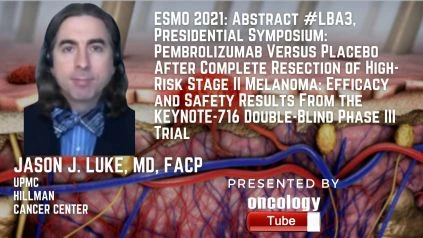Jason J. Luke, MD, FACP, Cancer Immunotherapeutics Center, UPMC Hillman Cancer Center speaks about ESMO 2021 Abstract #LBA3, Presidential Symposium: Pembrolizumab Versus Placebo After Complete Resection of High-Risk Stage II Melanoma: Efficacy and Safety Results From the KEYNOTE-716 Double-Blind Phase III Trial.
LBA3_PR Abstract –
Background:
Observation is the current standard of treatment for patients (pts) after excision of high-risk stage II melanoma. We compared pembrolizumab (pembro) to placebo in patients with resected AJCC-8 stage IIB or IIC melanoma in phase 3 double-blind KEYNOTE-716 study. The first interim study of recurrence-free survival (RFS) is presented.
Methods:
Patients over the age of 12 who had full excision of cutaneous stage IIB or IIC melanoma and a negative sentinel lymph node biopsy were randomized 1:1 to pembro 200 mg (2 mg/kg for pediatric patients) or placebo Q3W for 17 cycles (up to 1 year). T categories 3b, 4a, 4b (adults) were used to stratify the randomization, with a separate stratum for pediatric patients. Treatment was continued until the disease recurred or the side effects were too much to bear. RFS was the main endpoint, as determined by the investigators. Safety was also taken into consideration. The intermediate analysis’ data cutoff date was December 4, 2020.
Results:
A total of 976 points were randomized (64 percent stage IIB; 34.8 percent stage IIC) (487 pembro; 489 placebo). Pembro substantially extended RFS compared to placebo at a median follow-up of 14.4 months (HR 0.65, 95 percent CI 0.46-0.92; P=0.00658; median not achieved for both). A recurrence occurred in 54 (11.1%) versus 82 (16.8%) of the patients, with distant recurrence occurrences virtually half in the pembro (23) vs placebo (38) group. The 12-month RFS rate was 90.5 percent, compared to 83.1 percent the previous year. In the pembro versus the placebo group, there were 125 (25.9%) grade 3 any-cause AEs compared to 83 (17.1%) in the placebo group. 78 (16.1 percent) vs 21 (4.3 percent) pts had grade 3 drug-related AEs, with 74 (15.3 percent) vs 12 (2.5 percent) pts discontinuing owing to a drug-related AE. Pembro had no deaths owing to any-cause or drug-related AEs, while placebo had four deaths due to any-cause AEs. Hypothyroidism (15.7 percent vs. 3.5 percent ) and hyperthyroidism (15.7 percent vs. 3.5 percent ) were the most prevalent immune-mediated adverse events (36.2 percent vs. 8.4 percent ). (10.4 percent vs 0.6 percent ). The majority were of a severity level of 1-2.
Conclusions:
When compared to placebo, adjuvant pembrolizumab for resected stage IIB and IIC melanoma reduced the risk of disease recurrence or mortality by 35%, was linked with considerably longer RFS and had a good benefit-risk profile.
Clinical trial identification
NCT03553836; EudraCT 2018-000669-35; First posted: June 12, 2018.

